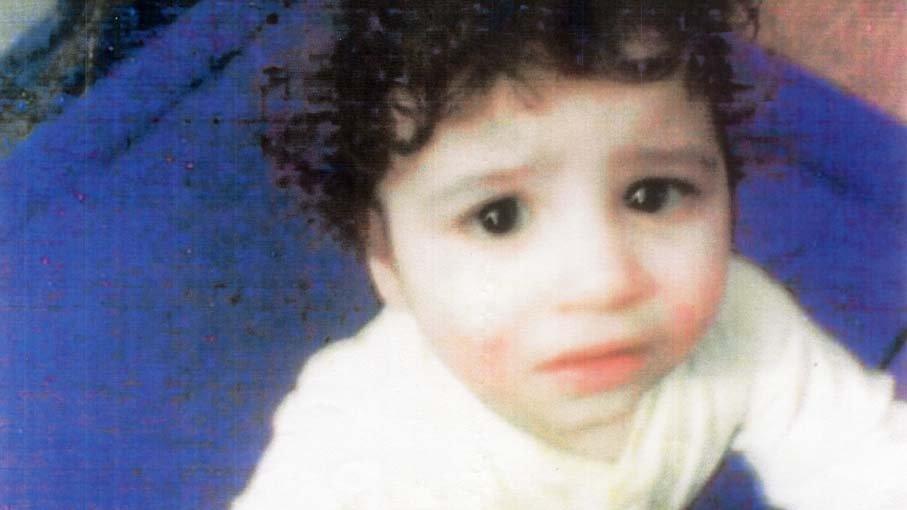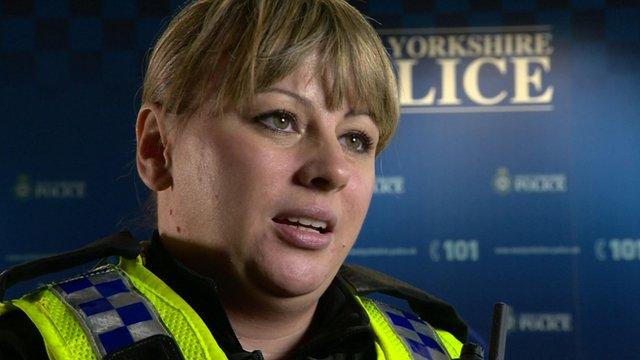Amanda Hutton guilty of starving Hamzah Khan to death
- Published
The scene inside Amanda Hutton's home where her son's body was found
A woman whose four-year-old son starved to death and was left in his cot for nearly two years has been found guilty of killing him.
Hamzah Khan's mummified remains were found in squalor at their Bradford home in September 2011 after he died due to severe malnutrition.
His mother, Amanda Hutton, 43, was convicted of manslaughter by gross negligence at Bradford Crown Court.
Hutton was remanded in custody and is due to be sentenced on Friday.
Squalid conditions
The jury heard Hamzah had a "grossly inadequate" diet, suffered osteoporosis and was wearing a baby grow for a six to nine-month-old infant when he died.
Returning the verdict after almost five hours of deliberation, the foreman of the jury made it clear jurors had convicted Hutton on the basis that she was grossly negligent by not providing adequate nourishment for Hamzah.

Amanda Hutton claimed she had struggled to get her son to eat
The two-week trial heard Hamzah's body was found in the house in the Heaton area of the city in terrible squalor, where five other siblings of school age were living.
Hutton admitted a charge of child cruelty in respect of each of these children, who were aged between five and 13 in 2011.
Hutton has also admitted a charge of preventing the burial of a corpse, along with her eldest son, Tariq, 24, who will also be sentenced on Friday.
Prosecutors said Hamzah most probably died from malnutrition because Hutton neglected him as she concentrated on her alcohol addiction.
They said she starved her son to death.
Hutton claimed she had struggled to get her son to eat and he had died suddenly.
Hamzah's decomposed body was found in a travel cot in Hutton's bedroom.
'Pain and suffering'
The trial heard his remains had been in the cot for almost two years when they were found by police searching the house on 21 September 2011.
Hamzah had died in December 2009.
PC Jodie Dunsmore West Yorkshire Police: "She (Amanda Hutton) had flies coming off her"
Det Supt Lisa Griffin, from West Yorkshire Police, who led the investigation, said the "heart-breaking" case was the worst she had seen during 28 years in the police service.
She said she had never seen such "appalling" conditions as those inside the house in Bradford when the body of Hamzah was discovered.
The conditions in the house had gone from being "presentable" to being "absolutely squalid" at the time Hamzah's body was discovered, said Ms Griffin.
Hutton had "many opportunities" to accept the professional support which had been offered to her but she had chosen not to, she added.
"She was obstructive, she was difficult and she failed in her ability to parent that child, to look after his basic needs, and sadly he died in the most difficult of circumstances.
"I can only imagine the pain and the suffering that that child endured."
'Dreadful tragedy'
Speaking outside court, Malcolm Taylor, from the Crown Prosecution Service, said Hamzah's death was a "horrific crime".
"It is heart-breaking to contemplate the suffering Hamzah must have endured."
Ralph Berry, Bradford Council's executive member for children and young people, said Hamzah's death was a "dreadful tragedy" that had shocked and appalled local people.

Police found Amanda Hutton's living room and other rooms strewn with rubbish
Professor Nick Frost, independent chair of Bradford Safeguarding Children Board, said the findings of a serious case review into the circumstances surrounding Hamzah's death would be published once all other proceedings had been completed.
"The main aim of the report is to make sure all agencies involved learn lessons and change working practices where necessary.
"However, given the refusal of all offers of help that would be offered to any mother and the lack of serious concerns raised from any other source, there was limited involvement from statutory agencies."
Peter Wanless, chief executive of the NSPCC, said it was obvious something had gone seriously wrong in Hamzah's case.
"It appears Hamzah disappeared off the radar of his community and services, and a full picture of the horror that was his life emerged two years too late," he said.
- Published3 October 2013

- Published3 October 2013

- Published3 October 2013

- Published3 October 2013

- Published3 October 2013
